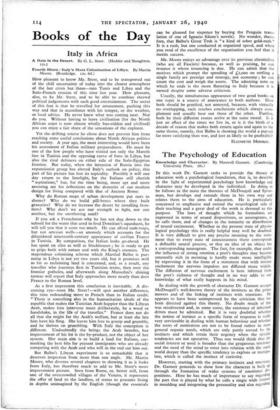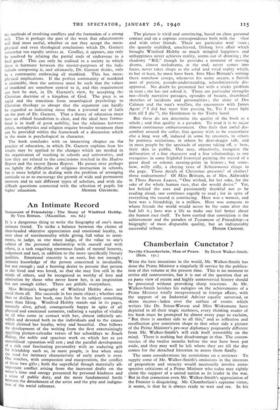The Psychology of Education
IN this work Dr. Garnett seeks to provide the theory of education with a psychological foundation, that is, to describe in the light of experimental psychology how knowledge and character may be developed in the individual. In doing so he follows in the main the theories of McDougall and Spear- man, but develops and extends them in his own way and relates them to the aims of education. He is particularly concerned to emphasise and extend the neurological side of their teaching and a great deal of the work is devoted to this purpose. The laws of thought which he formulates are expressed in terms of neural dispositions, or neurograms, as he calls them, and of changes in the intensity or distribution of neural excitement. Whether in the present state of physio- logical psychology this is really helpful may well be doubted. It is very difficult to give any precise meaning to the state- ment that to every state of consciousness there corresponds a definable neural process, or that an idea of an object has a corresponding neurogram. The fact, for example, that under the influence of strong emotion a poet's thoughts may become unusually rich in meaning is hardly made more intelligible by expressing it in the form of a statement that with intense excitement the nervous impulses are diffused more widely. The diffusion of nervous excitement is here inferred from the poet's richness of thought and in no way adds to our knowledge of what really happens in his mind.
In dealing with the growth of character Dr. Garnett accepts McDougall's well-known theory of the instincts as the prime movers and of the linking of instincts with emotions. He appears to have been unimpressed by the criticism that has been directed against this theory. No doubt much of this was misdirected and, in some sense, the existence of inherited drives must be admitted. But it is very doubtful whether the notion of instinct as a specific form of response is really very serviceable in dealing with human behaviour and whether
the roots of motivation are not to be found rather in more general organic needs, which are only partly served by the instincts and which retain their urgency when the specific tendencies are not operative. Thus one would think that the social interest or need is broader than the gregarious tendency and the need of the mind to enter into relation with the outer world deeper than the specific tendency to explore or manipu- late, which is called the instinct of curiosity.
However, starting with the primary instincts and emotions, Dr. Garnett proceeds to show how the character is built I113 through the formation of wider systems of emotional dis- positions. Here he has much of importance to say regarding the part that is played by what he calls a single wide interest in moulding and integrating the personality and also regarding
the methods of resolving conflicts and the formation of a strong will. This is perhaps the part of the work that educationists will find most useful, whether or not they accept the meta- physical and even theological conclusions which Dr. Garnett somewhat too rapidly arrives at. Conflict, it appears, can only be resolved by relating the partial ends of endeavour to a final good. This can only be realised in a society in which there is harmony between the master-purposes of the indi- viduals composing it, and ultimately, Dr. Garnett thinks, only in a community embracing all mankind. This has meta- physical implications. If the perfect community of mankind is attainable, then the universe must be such that the values of mankind are somehow central to it, and this requirement can best be met, in Dr. Gametes view, by accepting the Christian doctrine of a kingdom of God. The pace is so rapid and the transition from neurological psychology to Christian theology so abrupt that the argument can hardly be regarded as indicating more than a personal act of faith on the part of Dr. Garnett. That a theory of education must have an ethical foundation is clear, and the ideal here formu- lated is in itself of great nobility, but the relations between ethick, metaphysics and religion require broader treatment than can be provided within the framework of a discussion which in the main is psychological in character.
The book concludes with an interesting chapter on the practice of education, in which Dr. Garnett explains how his results may be applied to the changes which are needed in the organisation of teaching in schools and universities, and how they are related to the conclusions reached in the Hadow Report and the recent Spens Report. He passes over perhaps too lightly the difficulties of religious instruction in schools, but is more helpful in dealing with the problem of arranging curricula so as to encourage the growth of wide and permanent interests and to suit different types of scholars, and with the difficult questions connected with the selection of pupils for







































 Previous page
Previous page